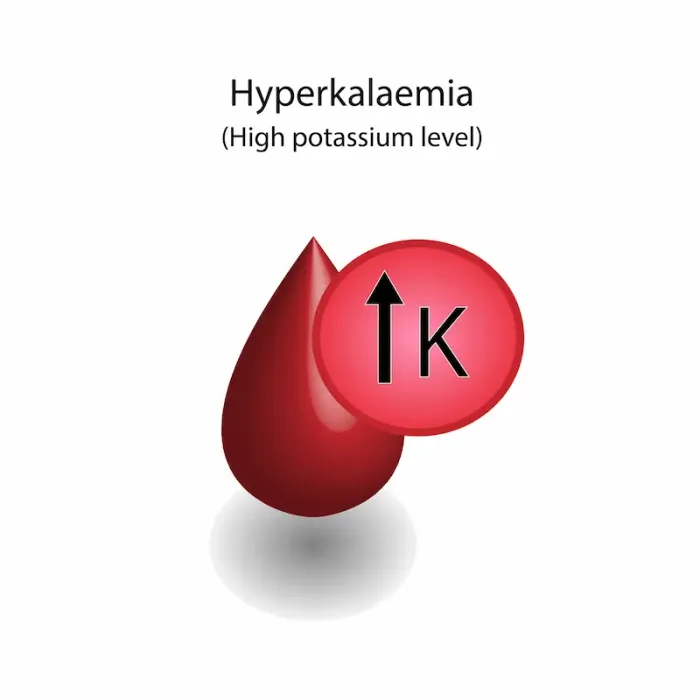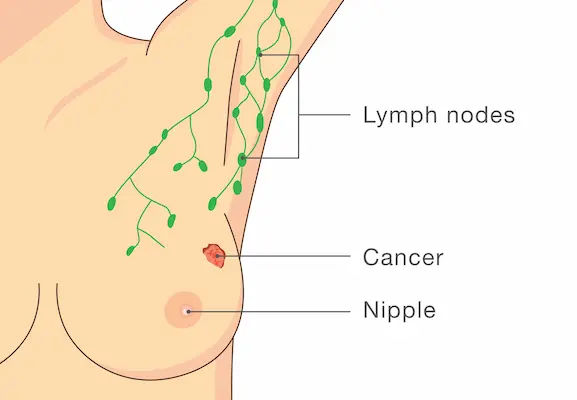High Potassium Levels in Blood Causes, Risks, and Treatment
Learn what hyperkalemia is, why it happens, how a potassium blood test works, and safe treatments. Spot warning signs and know when to seek urgent care.

Written by Dr. J T Hema Pratima
Reviewed by Dr. Dhankecha Mayank Dineshbhai MBBS
Last updated on 13th Jan, 2026

Introduction
Potassium is a vital mineral that supports healthy nerve function, muscle contraction, and heart rhythm. However, when potassium levels in the bloodstream rise too high—a condition known as hyperkalaemia—it can become dangerous, sometimes without any obvious warning signs. Many people only discover high potassium levels through a routine blood test.
This guide explains what hyperkalaemia means, why it matters, its main causes, how doctors diagnose and treat it, and the practical steps you can take to prevent complications and maintain safe potassium levels.
Consult a Top General Practitioner for Personalised Advice
What Is Hyperkalaemia?
Hyperkalaemia occurs when the concentration of potassium in the blood exceeds the normal range. In most laboratories, this range is typically 3.5 to 5.0 (or 5.1) millimoles per litre (mmol/L).
Doctors often classify hyperkalaemia by severity:
- Mild: 5.1–5.5 mmol/L
- Moderate: 5.6–6.0 mmol/L
- Severe: Above 6.0 mmol/L, particularly if heart rhythm changes are present
Because exact normal ranges can vary slightly by laboratory and by individual health conditions, your doctor will interpret your result in the context of your overall medical picture.
Why High Potassium Matters: Risks and Symptoms
Excess potassium can interfere with the electrical impulses that control your heart. Severe or rapidly rising potassium levels can lead to dangerous heart rhythm disturbances and, in rare cases, cardiac arrest.
Possible Symptoms
Many people with hyperkalaemia experience no symptoms at all, especially when potassium rises gradually. When symptoms do appear, they may include:
- Fatigue or generalised weakness
- Numbness or tingling sensations
- Nausea or queasiness
- Muscle cramps or heaviness
- Palpitations, dizziness, fainting, or chest discomfort
Potential Risks
If left untreated, hyperkalaemia can lead to:
- Abnormal heart rhythms (arrhythmias)
- Cardiac arrest (a life-threatening emergency)
- Muscle paralysis in very severe cases
Seek emergency medical help immediately if you develop chest pain, severe weakness, fainting, or if you know you have a very high potassium level.
Common Causes of High Potassium
Hyperkalaemia can develop for several reasons, often involving the kidneys, medications, or shifts of potassium between body compartments. Common causes include:
Reduced Kidney Function (Most Common Cause)
- Chronic kidney disease (CKD) or acute kidney injury (AKI): The kidneys are responsible for excreting excess potassium. When kidney function declines, potassium builds up more easily.
Medications That Raise Potassium
Several commonly prescribed drugs can increase potassium levels:
- ACE inhibitors (e.g., lisinopril, ramipril)
- ARBs (e.g., losartan, valsartan)
- Potassium-sparing diuretics (spironolactone, eplerenone, amiloride, triamterene)
- Certain antibiotics (such as trimethoprim, in co-trimoxazole)
- NSAIDs (e.g., ibuprofen, naproxen)
- Heparin
- Beta-blockers
- Digoxin toxicity
- Immunosuppressants (cyclosporine, tacrolimus)
Always review your medication list with your clinician if your potassium is found to be elevated.
Shifts of Potassium from Cells into the Blood
- Uncontrolled diabetes or diabetic ketoacidosis (DKA)
- Severe metabolic acidosis
- Major tissue injury or breakdown (burns, crush injuries, rhabdomyolysis, tumour lysis syndrome)
- Severe haemolysis (breakdown of red blood cells)
Increased Potassium Intake (Less Common in Healthy Kidneys)
- Potassium supplements
- Salt substitutes containing potassium chloride
- Very high intake of potassium-rich foods in individuals with kidney impairment
Pseudohyperkalaemia (False High Result)
Sometimes, potassium appears high on lab results due to blood cell damage during sample collection or very high platelet/white cell counts. If your results do not fit your symptoms or history, your clinician may repeat the test.
How Doctors Diagnose High Potassium?
Diagnosis begins with reviewing your symptoms, medical history, medications, and test results. The evaluation usually includes:
Potassium Blood Test: What to Expect
- A simple blood test measures your potassium level; fasting is not usually required.
- If results are unexpectedly high, the test may be repeated to exclude lab error (pseudohyperkalaemia).
- Additional blood tests may check kidney function (creatinine, eGFR), blood glucose, and acid-base balance (bicarbonate).
- In some cases, a urine potassium test may help determine the underlying cause.
Other Useful Tests
- Electrocardiogram (ECG/EKG): Detects heart rhythm changes caused by high potassium, such as peaked T-waves, widened QRS complexes, or loss of P-waves. These findings guide how urgently treatment is needed.
- Additional investigations: If adrenal gland issues or tissue breakdown are suspected, further blood and urine tests may be ordered.
Get Your Health Assessed
Treatment: How Doctors Manage High Potassium
The treatment for high potassium includes:
Treatment depends on how high your potassium is, whether symptoms or ECG changes are present, and what has caused the rise. Do not attempt to treat hyperkalaemia on your own, as severe cases can be life-threatening.
Emergency Treatment (For Severe or Symptomatic Cases)
1. Stabilising the Heart
- Intravenous calcium (e.g., calcium gluconate) protects the heart’s electrical activity. It does not reduce potassium levels but buys time for other treatments to work.
2. Shifting Potassium Back into Cells
- IV insulin with glucose (to prevent hypoglycaemia)
- Inhaled beta-2 agonists (e.g., salbutamol/albuterol)
- IV sodium bicarbonate if acidosis is present
3. Removing Potassium from the Body
- Loop diuretics (e.g., furosemide) if you are still producing urine
- Potassium binders (such as patiromer or sodium zirconium cyclosilicate) which trap potassium in the intestines
Dialysis, when levels are dangerously high and/or kidney function is severely impaired
Ongoing Management and Prevention
Once the immediate danger is over, long-term strategies aim to prevent recurrence. The ongoing management & prevention includes:
Addressing the Underlying Cause
- Treat dehydration, infections, or metabolic issues.
- Manage diabetes effectively.
- Correct acidosis and treat tissue injury or adrenal disorders as needed.
Medication Review
- Your doctor may temporarily reduce, adjust, or stop drugs that raise potassium.
- In some cases, potassium binders are prescribed to allow you to continue taking life-saving heart or kidney medications such as ACE inhibitors or ARBs safely.
Diet and Supplements
- Avoid potassium supplements unless your clinician specifically advises otherwise.
- Check salt substitutes: Many “low-sodium” or “no-salt” products contain potassium chloride and can raise your potassium dangerously.
- Work with a renal dietitian if you have kidney disease to create a balanced eating plan that fits your needs.
Monitoring and Follow-Up
- After starting or adjusting medicines that affect potassium, your clinician may recheck levels within 1–2 weeks.
- Ongoing testing schedules depend on your health and medication use.
Daily Habits and Food Tips
The daily habits and food tips include:
- Read food labels carefully: Products marketed as “no-salt” often contain potassium chloride.
- Stay hydrated and manage constipation with your doctor’s advice, as bowel movements help excrete potassium.
- Eat balanced meals: Many nutritious foods naturally contain potassium, so portion control and individualised guidance are key.
Work with a dietitian: They can recommend appropriate serving sizes and alternatives to high-potassium foods, such as:
- Bananas, oranges, and dried fruits
- Tomatoes, potatoes, spinach, and avocados
- Coconut water and certain legumes
The goal is moderation—not complete avoidance—unless your clinician specifies otherwise.
When to Seek Urgent Care?
Call emergency services or go to the nearest hospital immediately if you experience:
- Chest pain or severe shortness of breath
- Fainting, dizziness, or palpitations
- Sudden or severe muscle weakness
- A known potassium level ≥6.0 mmol/L, or any level associated with symptoms
- Missed dialysis sessions or known kidney failure with new symptoms
If your potassium is only mildly raised and you feel well, contact your healthcare provider promptly for further advice—do not alter your medication or diet on your own.
Preventing High Potassium: Practical Steps
- Know your risks: Kidney disease, diabetes, heart failure, older age, and certain drugs increase risk.
- Medication check-ups: Keep an up-to-date list of all prescriptions, supplements, and over-the-counter medicines.
- Consistent monitoring: Follow your clinician’s recommendations for lab tests, especially after changes in treatment.
- Manage chronic conditions: Controlling blood pressure, blood sugar, and hydration helps protect kidney and heart health.
- Dietary support: A renal dietitian can guide you in enjoying a nutritious diet while maintaining safe potassium levels.
Key Takeaways
The key take away points include:
- High potassium can be silent yet dangerous, particularly for the heart.
- The most common cause is kidney disease, often worsened by certain medications.
- Diagnosis relies on blood tests and sometimes ECG findings.
- Treatment ranges from emergency stabilisation to long-term management through diet, medication review, and monitoring.
- Always consult your healthcare team before changing any treatment, diet, or supplement routine.
Conclusion
Hyperkalaemia is a potentially serious but manageable condition when detected early and treated correctly. Regular blood monitoring, awareness of medication effects, and healthy lifestyle habits can significantly reduce your risk. If you have kidney disease or take medicines that influence potassium levels, make routine testing part of your healthcare plan. Working closely with your doctor and dietitian helps you maintain a safe potassium balance—supporting your heart, kidneys, and overall wellbeing.
In essence, knowledge and vigilance are your strongest defences against the silent risks of high potassium.
Consult a Top General Practitioner for Personalised Advice
Consult a Top General Practitioner for Personalised Advice

Dr. Mainak Baksi
General Practitioner
13 Years • MBBS , MD (MPH)
Howrah
Mainak Baksi Clinic, Howrah
(50+ Patients)

Dr Suseela
General Physician
5 Years • MBBS
Bengaluru
Apollo Medical Center, Marathahalli, Bengaluru

Dr. Rajib Ghose
General Physician/ Internal Medicine Specialist
25 Years • MBBS
East Midnapore
VIVEKANANDA SEBA SADAN, East Midnapore

Dr. Ishita Mandal
General Surgeon
7 Years • MBBS(hons.), MS(general surgery), General and laparoscopic surgeon
Kolkata
VDC Clinic, Kolkata

Dr. Ankitha
Internal Medicine Specialist Diabetologist
6 Years • MD INTERNAL MEDICINE
Bengaluru
Apollo Medical Center, Marathahalli, Bengaluru
(25+ Patients)
Consult a Top General Practitioner for Personalised Advice

Dr. Mainak Baksi
General Practitioner
13 Years • MBBS , MD (MPH)
Howrah
Mainak Baksi Clinic, Howrah
(50+ Patients)

Dr Suseela
General Physician
5 Years • MBBS
Bengaluru
Apollo Medical Center, Marathahalli, Bengaluru

Dr. Rajib Ghose
General Physician/ Internal Medicine Specialist
25 Years • MBBS
East Midnapore
VIVEKANANDA SEBA SADAN, East Midnapore

Dr. Ishita Mandal
General Surgeon
7 Years • MBBS(hons.), MS(general surgery), General and laparoscopic surgeon
Kolkata
VDC Clinic, Kolkata

Dr. Ankitha
Internal Medicine Specialist Diabetologist
6 Years • MD INTERNAL MEDICINE
Bengaluru
Apollo Medical Center, Marathahalli, Bengaluru
(25+ Patients)
More articles from General Medical Consultation
Frequently Asked Questions
1) What Potassium Level Is Dangerous?
There is no single danger threshold for everyone. However, levels above 6.0 mmol/L or any level causing ECG changes or symptoms are medical emergencies. The rate of rise and your heart’s response also matter.
2) Can You Have High Potassium Without Symptoms?
Yes. Many people feel perfectly well even when potassium is dangerously high, which is why regular blood tests are essential for those at risk.
3) Which Medications Commonly Raise Potassium?
ACE inhibitors, ARBs, potassium-sparing diuretics, NSAIDs, trimethoprim, heparin, beta-blockers, and certain immunosuppressants are frequent culprits. Never stop prescribed medication without professional advice.
4) Should I Stop My ACE Inhibitor or ARB if Potassium Is High?
Do not discontinue these medications on your own. They provide significant heart and kidney protection. Your doctor may adjust the dose, modify your diet, or prescribe a potassium binder instead.
5) How Often Should I Have a Potassium Test?
Testing frequency depends on your health and treatment plan. Typically, potassium is checked 1–2 weeks after starting or adjusting any medicine that may raise levels, and then periodically thereafter as advised.





